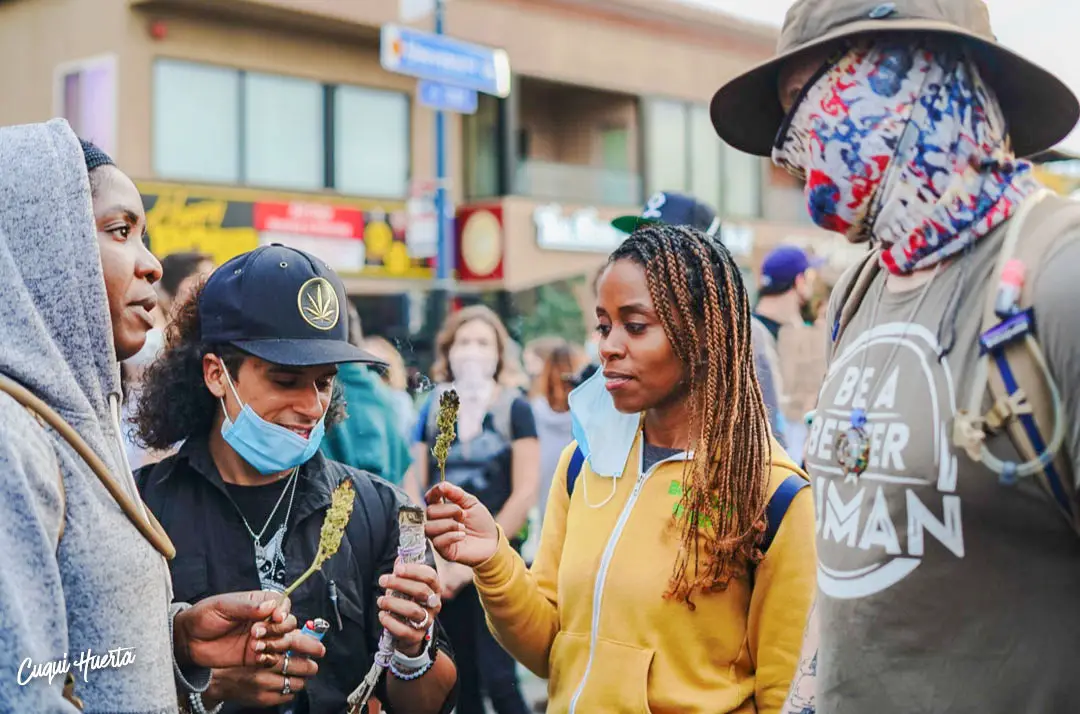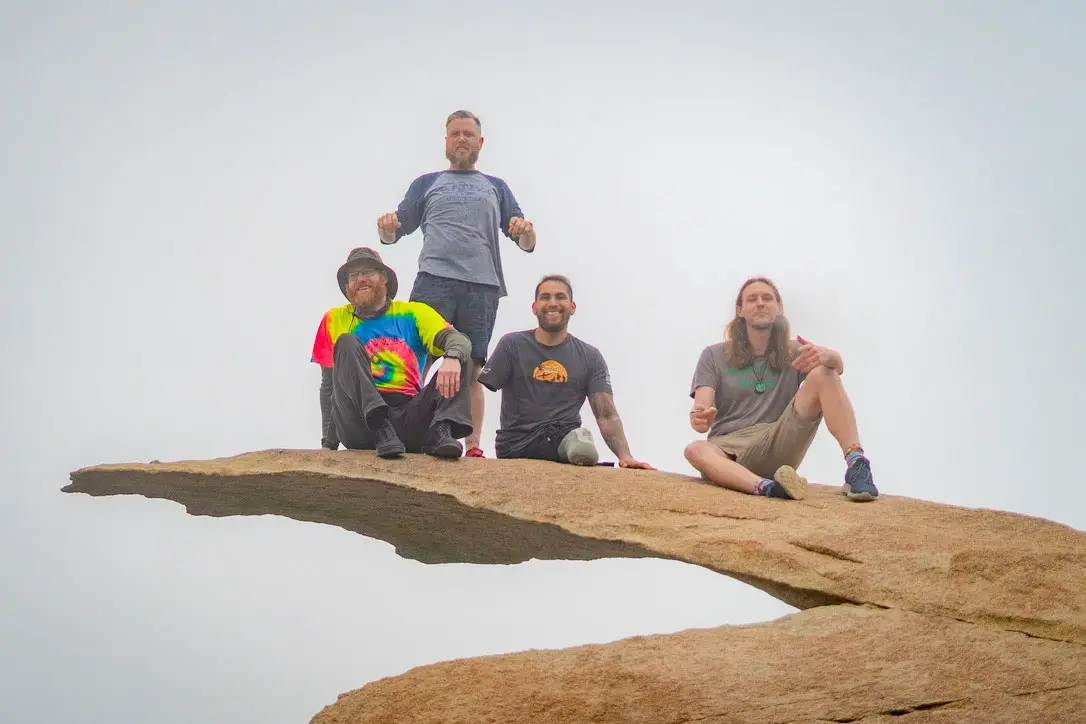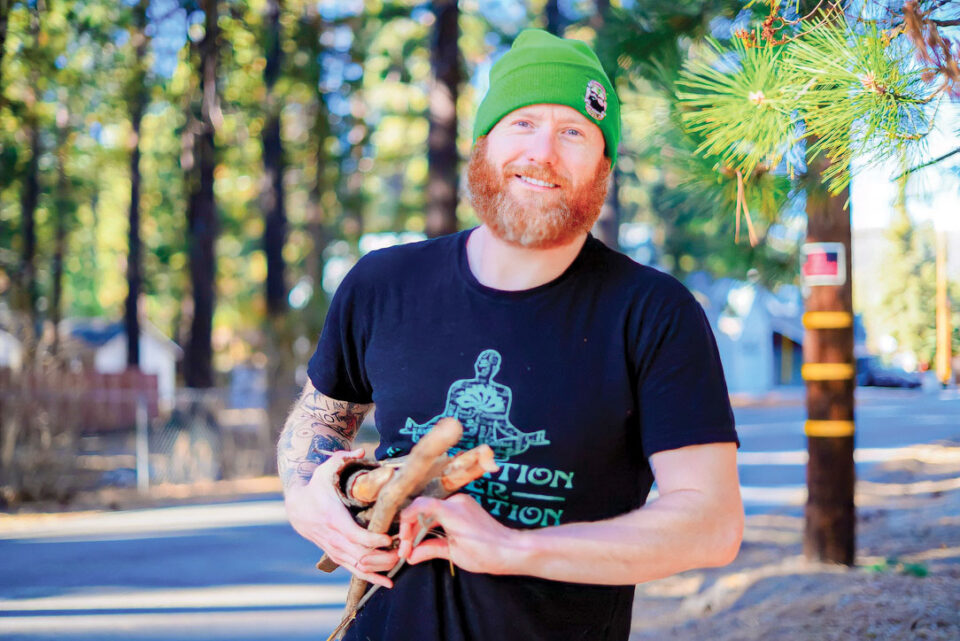VISTA — From midnight raids in central Helmand Province to pre-dawn group hikes to Potato Chip Rock, Army veteran Colin Wells has forged a path to healing in his transition from soldier to civilian.
Wells, 39, a recovering heroin addict, has come a long way since his days as an infantryman with the Stryker brigade combat team out of Joint Base Lewis–McChord near Tacoma, Washington.
Today, the self-described “reformed stormtrooper” and father of four children — Bronson, 10, Grayson, 7, Sawyer, 8, and 6-month old girl Willow — has combined the psychological benefits of cannabis with his love for the outdoors to establish a nonprofit, Veterans Walk and Talk.
Veterans Walk and Talk invites veterans to enjoy the region’s natural beauty and partake in plant-based therapies in a safe community setting.
The idea for the group came to Wells after he discovered the combined benefits of cannabis and spending time outdoors helped ease symptoms of post-traumatic stress disorder (PTSD), which he developed after a month of intense conflict in the Battle of Marjah.
“When I was in Afghanistan, as an infantryman, (our mission was) to seek out and destroy enemies,” Wells told The Coast News. “We went looking for trouble, basically. We exploited over 100 IEDs (improvised explosive devices) during that time. We slept in the dirt. It was close to constant warfare as one can get in the current conflicts we are engaged in.”
Eventually, Wells left Central Asia with both physical and psychological wounds, including a traumatic brain injury, chronic pain and mental anguish related to his combat experiences.
All of this made his readjustment to post-military civilian life more difficult.

“Getting out of the Army, they don’t really set you up for success,” Wells said. “(You’re just) in one day and out the next.”
According to a study by the Rand Corporation, a nonprofit think tank providing research to the Armed Forces, between 15% and 44% of veterans deployed since 9/11, have developed a dependence on alcohol; 44% have difficulty with civilian life; 48% experience strains in family life, and 47% feel sudden outbursts of anger.
In 2017, another study found that of 5,826 veteran participants, roughly 13% were diagnosed with PTSD — nearly double the PTSD incidence rate among the general population (roughly 6.9%).
And it appears those numbers are growing. As previously reported by Time Magazine, PTSD diagnoses among deployed troops grew by 400% from 2004 to 2012.
To find some help, Wells entered Salvation Army Haven Program located at the West Los Angeles Veterans Affairs Medical Center.
The program was basically a 30-day veterans’ homeless shelter with four guys to a room, according to Wells.
“There was never a moment when it came flooding out and I got better,” Wells said. “It was just eat your food, go to group therapy, wash, rinse and repeat.”
But after months of sobriety, Wells was removed from the program following an argument with his roommate.
And suddenly, just like thousands of veterans across the country, Wells had nowhere to go.
Into the Mountains
With his newfound freedom, Wells grabbed his old camping gear out of storage and retreated into the Santa Monica mountains, roaming vacant campgrounds looking for places to sleep.
It was during this time that Wells started using cannabis more intentionally.
“Looking back, I’m super grateful (I got kicked out of the VA program) because it sent me on the path toward cannabis and plant medicines,” Wells said. “From that point on, I said enough is enough, my firstborn was a baby at the time, I rallied around myself and started to get better.”
In six months, Wells weaned himself off pharmaceuticals, including methadone and blood pressure medications, and started feeling healthy again.
By then, Wells was healthy enough to start working as a cashier at REI, which eventually led him to a position as a camp specialist for the popular outdoor retail company.

In late 2016, Wells started contacting other veterans on social media to join him on hikes around San Diego County.
The Vista resident started visiting area VA shelters, talking to veterans during their smoke breaks.
“I would say, ‘Hey, on Sunday morning at 4 a.m., we will go to the woods, smoke cannabis and talk about our problems. Some of the most amazing veterans have shown up and continued to show up for that.”
As the groups grew in size and Wells continued to talk about his cannabis use, the organization attracted the attention of Bill and Jeff Levers, founders of cannabis company Beard Bros Pharms.
Wells told them he wanted to provide veterans with free cannabis when they hike.
The Levers brothers responded by meeting Wells at a grocery store parking lot in Reseda, California, and donating a stash of assorted cannabis products — flower, shatter, wax, infused ranch dressing powder — to hand out to veterans, free of charge.
Veterans Walk and Talk soon attracted other sponsors, including Dear Cannabis, MedLeaf Delivery (Oceanside), A Future for Vets Foundation, Cali Blaise, Cannabis Scapes, VETality Corp (Escondido) and many others.
Wells started traveling across the country, sharing his message in Arkansas, West Virginia, North Carolina and Oklahoma. Since 2016, Veterans Walk and Talk has opened up chapters in 12 cities across the country, including Chicago, Sacramento and Dallas.
Helping Others
Eventually, Wells had upwards of 30 veterans attending the morning hikes, including triple amputee veteran and Team USA adaptive surfer, Jose Martinez.
Martinez, who lost both of his legs and right arm after stepping on an IED in Afghanistan, accompanied Wells and other vets on the group’s trek to Potato Chip Rock in unincorporated San Diego County.
“(Martinez) is an absolute force,” Wells said.
Johann Marie “JM” Balbuena, 37, has also experienced therapeutic benefits by participating in Veterans Walk and Talk.
Balbuena, a Navy veteran specializing in aviation technology, served two deployments on the USS John C. Stennis for operations Iraqi Freedom and Enduring Freedom.
During her time in the Navy, Balbuena suffered a concussion that changed her life. The symptoms included disrupted sleeping and eating habits, which in turn created additional tension in her life.
“Working on the flight deck, I developed tinnitus and coupled with no sleep, it created a low quality of life (for me),” Balbuena said.

The South Bay resident, born in the Dominican Republic, was introduced to cannabis and she noticed her quality of life start to improve. In addition to cannabis, Balbuena also sought help from a therapist and participated in various studies and programs at the VA.
“Before cannabis, when I was living with a lack of sleep, I thought about suicide on a daily basis,” Balbuena said. “In my mind, it was always like, life should not be like this. Nobody should live like this. The first time I consumed cannabis with my friend, I saw the light. It helped me think clearly.”
Balbuena went on to form Cannabis Synergy, a company focused on cannabis education, entertainment, consultancy and content creation.
She also wrote a bestselling book on Amazon, “The Successful Canna-preneur,” and formed a clothing brand, “Boycott Shitty Weed,” which emphasizes the importance of quality cannabis, supports businesses that uplift LGBTQ rights, social equity and justice, and propagates a “culture of community, education and advocacy” through fashion.
After more than seven years working in the cannabis industry, Balbuena eventually crossed paths with Wells and his organization. Since learning more about Veterans Walk and Talk, Balbuena got involved and has been helping the nonprofit for the past two years.
“(Veterans Walk and Talk) is for every veteran,” Balbuena said. “Whether you want to participate in using cannabis or psilocybin, you also have access to a community that understands you and we understand what you go through. For those spending 20 years in the military, Veterans Walk and Talk can provide that sense of security through community if you’re open to it. That’s what it did for me.”
Visit www.veteranswalkandtalk.com to learn more about Colin’s philosophy and upcoming group hikes in San Diego County.




